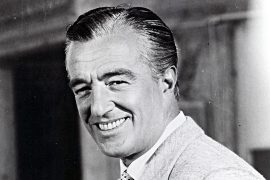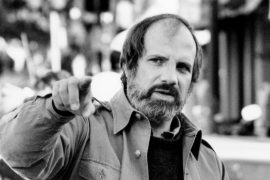The actor and singer was one of the great representatives of German cinema in the 1930s and 1940s; as “blonde Hans” he became a popular idol. Hans Albers celebrated his breakthrough in 1930 alongside Marlene Dietrich in “The Blue Angel”. He became unforgettable through his roles in films such as “Münchhausen” (1943), “Große Freiheit Nr. 7” (1944) or “Auf der Reeperbahn at night at half past twelve” (1954), in which he acted as an honest and upstanding Hanseatic with his steel-blue eyes that knew how to arouse melancholy and wanderlust like no other. Albers also developed the film role of the daring daredevil, which is typical for him. His most successful songs include “Flieger, greet me the sun” (1932), “On the Reeperbahn at night at half past twelve” (1936) and “Good-bye Johnny” (1938)…
Hans Albers was born in Hamburg on September 22, 1891, the son of master butcher Philipp Albers and his wife Johanna.
Albers grew up at Langen Reihe 71 in the St. Georg district of Hamburg, the youngest of six children. Albers already wanted to be an actor when he was at school. He attended the Uhlenhorst secondary school and was expelled from the school as a quartanist after a physical conflict with a teacher who was abusive. Albers experienced something similar in the St.Georgs-Realschule. He then began a commercial apprenticeship and worked in a silk company in Frankfurt am Main. He began his theater career at the New Theater there. Meanwhile, he took private acting lessons. In 1915 he received his first film role in “Seasons of Life”. After being drafted into the army that same year, Albers was badly wounded as a soldier in World War I on the western front. After the First World War, Albers played at various Berlin theaters, such as the Komische Oper.
In 1918 he got his first major supporting role in “Rauschgold”. After numerous silent film roles, in 1929 he played the leading role in the first German sound film, “The Night Belongs to Us”. Shortly thereafter, in April 1930, he had his breakthrough alongside Marlene Dietrich in “The Blue Angel”. Overnight Albers became a star as the artist “Mazeppa” and to this day “The Blue Angel” is one of the most important German films of the 1930s. In the same year, 1930, Albers shot the comedy “Hans in alle Gassen” under the direction of the later President of the Reich Film Chamber, Carl Froelich. In the early 1930s, Albers developed the film role of the daring daredevil typical of him in films such as “Bomben auf Monte Carlo” with Heinz Rühmann, “F.D.1 answers not” and “Der Sieger”. After the NSDAP came to power under Adolf Hitler in January 1933, Albers often presented himself as an opponent of the National Socialists. Nevertheless, he was also found in works such as “Blonder Hannes”, where he took on a heroic role after “brown” taste.
It is undeniable that Albers had a brilliant acting career in the so-called Third Reich and especially after the outbreak of the Second World War from 1939 to 1945. In 1933 he shone in the films “Today it depends” and “Refugees”. A year later and in 1935 Albers was in front of the camera for “Gold” and “Peer Gynt”. In the late 1930s, Albers switched genres with films like The Man Who Was Sherlock Holmes. The political situation around him became tense when the war broke out. The National Socialist camp accused him of living with a woman of “half-Jewish” descent. As a consequence, his partner Hansi Burg fled into exile in London in 1938. Albers remained in Nazi Germany, where he was instrumental in pacifying and raising morale on the “home front” during the war years. In fact, films such as “Trenck, der Pandur”, “Münchhausen” or “Große Freiheit Nr. 7″ were some of his most popular works. After the war, Albers” partner Hansi Burg returned from London in 1946. With his fatherly role in “Und über uns der Himmel” he celebrated a brilliant new beginning.
In his works, Albers has long embodied in his inimitable manner the robust, rough comrade who, like no other, was able to arouse longing and melancholic moods. His post-war successes included “Nights on the Streets” in 1952 and his starring role in the film “On the Reeperbahn at Half past midnight”, in which he also sang the song of the same name. In 1956 Albers played “Before Sunrise”. At the Berlin International Film Festival in 1956, Albers was awarded the Golden Bear for “Best Actor”. On June 23, 1960, Albers received the Federal Cross of Merit of the Federal Republic of Germany from the hands of Federal President Heinrich Lübke. His last film “No Angel is So Pure” was released in cinemas in 1960. He closes with the sentence spoken by Hans Albers: “This is the end”.
Hans Albers died on July 24, 1960 at the age of 68 in Kempfenhausen. In April 1964, the city of Hamburg renamed the former Wilhelmplatz in the St. Pauli district to Hans-Albers-Platz to commemorate him.
Works
1931: In Hamburg on the Elbe
1931: This is the love of sailors
1931: Child, you don’t need to cry
1931: I will kiss you if you ask
1931: Hamburger Kedelklopper
1932: Aviators, say hello to the sun
1932: Way back where the lighthouse is
1932: I came from Alabama
1932: Oops, here I come
1932: Come on the swing, Luise
1933: Lucky Hans
1933: Madam, come and play with me
1933: Whenever I’m Happy
1933: I’m Hans im Glück
1933: In 24 hours
1933: My gorilla has a mansion at the zoo
1934: Ase’s death
1934: Now I must go, goodbye, my child
1936: Under a hot sky
1936: Recording on the Reeperbahn at half past midnight
1936: In my heart darling, there is room for many
1936: And above us the sky
1937: Yes, gentlemen
1937: I have” a little philosophy
1937: Goodbye Jonny
1944: La Paloma
1944: The first time, it still hurts
1947: And above us the sky
1947: Music of longing
1947: Hein Mück
1947: Song of the Refugees
1947: Goodbye Johnny
1947: Between Hamburg and Haiti
1950: If You Were My Honey
1950: I don’t ask if you have money
1950: The Song of Nigger Jim
1950: The Song of Columbus
1950: La Paloma
1950: My uncle has plantations
1950: Five Little Monkeys
1950: Nic is as brown as a coffee bean
1950: On the Reeperbahn at half past midnight
1950: In Arizona and Arkansas
1950: Föhn
1950: Only in Texas
1950: Bohemian
1950: Fairground
1950: Harbor Song
1950: Say, what’s your name
1950: I came from Alabama
1950: The Wind and the Sea recording
1951: Lesser North Tern
1951: Captain’s name was Jack
1951: Coconuts and Bananas
1952: On a Starry Night at the Port
1952: Come on the swing, Luise
1952: On the Reeperbahn at half past midnight
1952: Little Möve, fly to Helgoland
1952: Take me with you, Captain, on the voyage
1952: O Signorina-rina-rina
1952: Little White Gull
1952: There is a Blue Peter in every port
1952: In Hamburg on the Elbe
1953: La Paloma
1953: Captain Bay-Bay from Shanghai
1954: Once more to Bombay
1957: Man must have a home
1957: The heart of St. Pauli
1957: Don’t Cry
1957: The Last Shirt
1957: My boy, keep your feet still
1958: Yes, life
1959: It doesn’t matter
1959: Tripple, tripple, trapp
Films
1915: Seasons of Life
1917: The daughter of Countess Stachowska
1918: Gold Rush
1918: The Courage to Sin
1918: Love and Life, Part 1 – The Soul of the Child
1918: Glowing Points
1918: Halka’s Pledge
1918: The Curse of Nuri/The Song of the Nisami
1919: From a man’s girlhood
1920: The Grand Hotel Babylon
1920: The 999th Night
1922: The Evil Spirit Lumpaci Vagabundus
1922: Human sacrifice
1922: The Fake Dimitri
1923: Irene d’Or
1923: Miss Raffke
1923: Inge Larsen
1924: The Testament of Joe Sivers/Testament of Ive Sievers
1925: A Midsummer Night’s Dream
1925: The King and the Little Girl
1925: front building and rear building
1925: The girl with the patronage
1926: The trumpets/hussar love are blowing
1926: The Sunken
1926: The Man from Beyond
1926: On the beautiful blue Danube
1926: Just a Dancer (Bara en danserska)
1926: The department store princess
1926: The Sunken Fleet
1927: A perfect gentleman
1927: The woman who can’t say no
1927: A Dubarry of today
1927: The Villa in the Tiergarten
1927: Primary love
1927: Always practice loyalty and honesty
1927: The golden abyss – castaways of life
1928: Gynecologist Dr. shepherd
1928: Mr. Master and Mrs. Master
1928: Saxophone Susi
1928: Woman on Fire
1929: The Red Circle
1929: Asphalt/The police sergeant and the diamond donkey
1929: Mascotte
1929: Inherited Drives: The Struggle for the New Sex
1929: Three make their luck / dear homeland
Sound films
1929: The night is ours
1930: The Blue Angel
1930: The Grabber
1930: Hans in all streets
1931: Three Days of Love
1931: Bombs on Monte Carlo
1931: The Daredevil
1932: The White Demon/The Drug
1932: The winner
1932: Monte Carlo Madness
1932: Quick
1932: F.P.1 does not answer
1933: Today it depends
1933: A certain Mr. Gran
1933: Refugees
1934: Gold
1934: Peer Gynt
1935: Executioners, women and soldiers
1935: Vaudeville
1936: Under a hot sky
1936: Savoy Hotel 217
1937: The Yellow Flag
1937: The Man Who Was Sherlock Holmes
1938: Sergeant Berry
1938: Travelers
1939: Water for Canitoga
1939: A man gone astray
1940: Trenck, the Pandur
1941: Carl Peters
1943: Munchausen
1944: Great Freedom #7
1945: Shiva and the Gallows Flower
1947: …and above us the sky
1950: Föhn/Storm in the East Face
1950: Chased by the Devil
1951: Bluebeard
1952: Night on the streets
1953: Jonny saves Nebrador
1953: Captain Bay-Bay
1954: Ten on each finger
1954: On the Reeperbahn at half past midnight
1955: The Last Man
1956: Before Sunset
1957: The Betrothed of Death
1957: The great bomber
1957: The heart of St. Pauli
1958: The Grabber
1958: The Man in the Stream
1958: Thirteen Old Donkeys
1960: No angel is so pure





